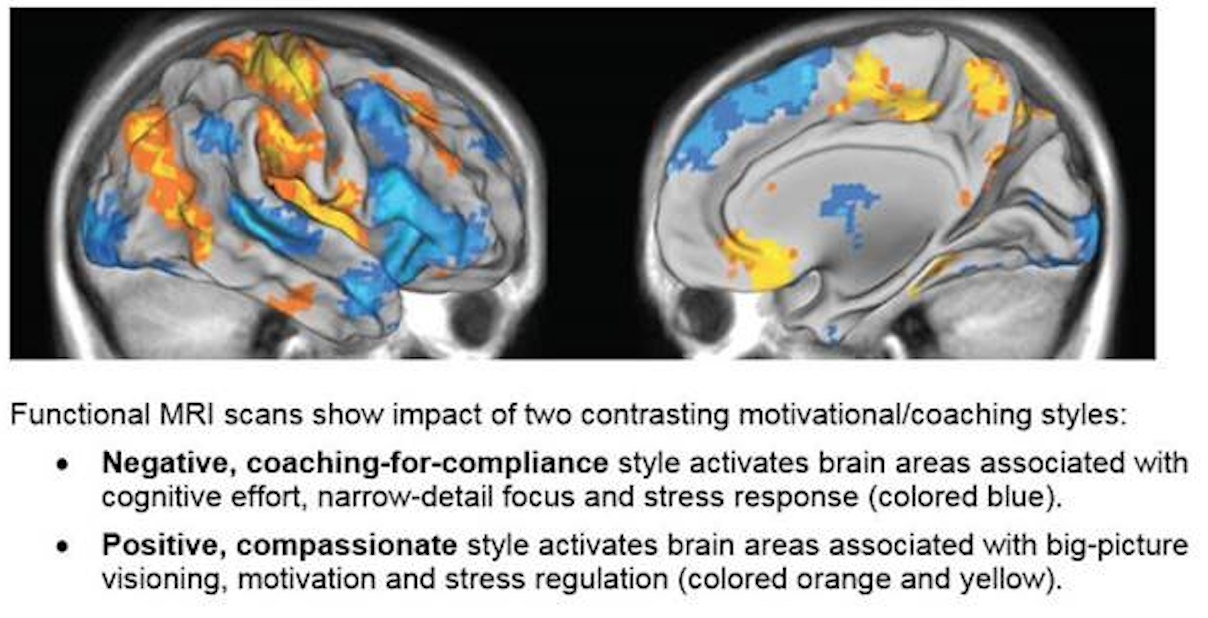fMRI Brain Scans Reveal Most Effective Motivational Techniques
News from the Society of Consulting Psychology:
fMRI Brain Scans Reveal Most Effective Motivational Techniques
Compassionate/visioning approach to managing, coaching, teaching and parenting may work best

Synopsis: Managers, coaches, teachers and parents often focus on fixing problems and deficiencies. Brainscans in this study suggest that may be exactly the wrong approach. Change is better encouraged by positively focusing on someone’s dreams and aspirations. Focusing on problems and challenges activates a defensive mindset that closes down an individual’s openness to change. This negative approach increases the psychological burden on someone already feeling challenged, while threatening their feeling of self-worth and self-determination.
Executive Coaching in Demand, according to CoachSource.com 2018 Survey:
- 80% of respondents expect executive coaching to increase over the next 3-5 years.
- Top 4 reasons: Leadership Development, Transition, Executive Presence, Fixing Problems.
- Total industry global spend: $1B-$5B USD (est.) On average, $19,000 spent per executive.
Study Results: As shown in fMRI scans, a positive coaching approach activates brain regions associated with big-picture thinking (“visioning”), engagement, motivation and stress regulation. This approach is often called coaching with compassion or coaching to one’s personal vision and dreams. It evokes a sense of possibility and self-empowerment.
A negative coaching approach activates regions of the brain associated with stress response and self-consciousness. This approach is often called coaching for compliance; it’s problem-centered and emphasizes external constraints. It inspires thoughts about judgment and obligations, and puts the participant in a defensive posture where motivation and openness to change are both decreased.
Method: In the study, 20 participants received two different coaching sessions, from coaches following two different approaches. The positive approach focused on the participant articulating their personal vision for work and life. The negative approach focused on the participants’ current challenges.
After the sessions, participants completed an online questionnaire. The positive coach was perceived to be considerably more inspirational, trusting and caring. The negative coach induced feelings of guilt and obligation.
During fMRI scans 3-5 days later, participants watched video clips of their prior coaching interactions – both positive and negative. Positive coaching approaches engaged the areas of the brain associated with engagement, motivation and stress regulation. (Research was built on previous neuroscience studies establishing that different brain regions are involved in analytic, task-centered thinking and social/emotional connections.)
Source: This research paper, “The Neuroscience of Coaching” was published in a special issue of Consulting Psychology Journal: Practice & Research, Spring 2018, which focused on the latest evidence-based research related to coaching, trust, goal-setting, etc. One of this special issue’s co-editors, psychologist Dr. Ken Nowack, says the issue’s goal was to share the latest evidence-based research related to coaching, trust, goal-setting, etc.
The paper was authored by Richard E. Boyatzis and Anthony I. Jack, from Case Western Reserve University. Dr. Boyatzis is professor in the departments of organizational behavior; psychology; and cognitive science. Jack is an associate professor of philosophy, psychology, neurology and neuroscience.
About The Society of Consulting Psychology:CPJ is a publication of the Society of Consulting Psychology (SCP), a division of the American Psychological Association. SCP represents over 1,000 psychologists who translate psychological science into practical methods for consulting with individuals, groups and organizations to catalyze growth and change.
Media Contact: Warren Djerf, for SCP. E-mail: [email protected] or Ph: (952) 920-3908.

















